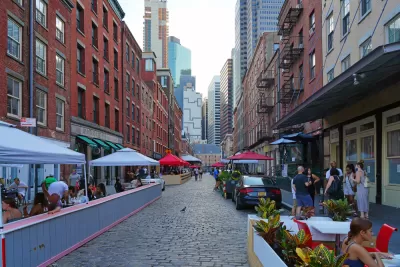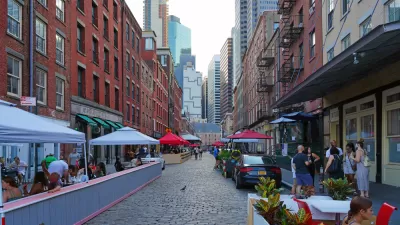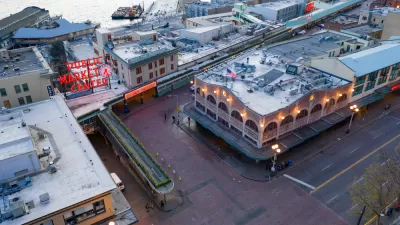New York City will now be measurably less car-centric for the indefinite future.

New York City Mayor Bill de Blasio announced late last week that the city of New York's Open Restaurants on Open Streets program, enacted as a lifeline for restaurants struggling to make ends meet during the COVID-19 pandemic, will be expanded and continued permanently.
Mayor de Blasio announced the city's new approach to restaurant regulations during an interview on Brian Lehrer's WNYC show, but the local urbanism news industry was quick to amplify the announcement.
Luke Fortney and Erika Adams report for Eater New York, explaining the details of the program as it will work in the future.
Under the new rules, restaurants will be allowed to keep sidewalk and curbside dining going indefinitely. The city’s Open Streets program, which designated dozens of city blocks to shut down to car traffic for dining in the street over the summer, will also be made a permanent fixture. "This will really help us as an important part of how we recover as a city," de Blasio said.
Restaurants will also be able to expand their frontage space to include seating in front of adjacent businesses if those landlords and tenants are open to it, the mayor said. He also stipulated that for restaurants that conduct outdoor dining in the winter, the space has to be kept “more open” to allow enough airflow. If the area is fully enclosed to better heat the space, those dining areas have to adhere to the same seating restrictions as indoor dining, which will start at 25 percent capacity next week.
According to Fortney and Adams, the permanent extension of the outdoor dining program comes as a result of protracted lobbying by restaurant owners. Despite the scheduled return of indoor dining in the city on September 30, many restaurant industry insiders consider outdoor dining essential for the survival of restaurant businesses through the winter.
The Open Streets component of this big reveal sparked the interest of Gersh Kuntzman at Streetsblog NYC, calling the mayor's announcement a long-overdue shift in priorities to people over cars. "It may turn out to be the single biggest conversion of public space since, well, since car drivers commandeered the curbside lane for free overnight vehicle storage in the 1950s," writes Kuntzman.
Kuntzman also notes that some of the program, as announced, can be achieved by executive action and other components will require legislative action by the City Council. Kuntzman also collects notable political reactions to the news, including that of advocates for mobile vending, who raise alarms about the city's track record of pushing out mobile street vendors to make room for the new outdoor dining arrangements.
FULL STORY: Outdoor Dining Is Now a Permanent NYC Fixture, Mayor Announces

Trump Administration Could Effectively End Housing Voucher Program
Federal officials are eyeing major cuts to the Section 8 program that helps millions of low-income households pay rent.

Planetizen Federal Action Tracker
A weekly monitor of how Trump’s orders and actions are impacting planners and planning in America.

The 120 Year Old Tiny Home Villages That Sheltered San Francisco’s Earthquake Refugees
More than a century ago, San Francisco mobilized to house thousands of residents displaced by the 1906 earthquake. Could their strategy offer a model for the present?

Washington State Legislature Passes Parking Reform Bill
A bill that would limit parking requirements for new developments is headed to the governor’s desk.

Missouri Law Would Ban Protections for Housing Voucher Users
A state law seeks to overturn source-of-income discrimination bans passed by several Missouri cities.

Op-Ed: Looking for Efficiency? Fund Intercity Buses
Much less expensive than rail, intercity buses serve millions of Americans every year, but public subsidies are lacking.
Urban Design for Planners 1: Software Tools
This six-course series explores essential urban design concepts using open source software and equips planners with the tools they need to participate fully in the urban design process.
Planning for Universal Design
Learn the tools for implementing Universal Design in planning regulations.
Ada County Highway District
Clanton & Associates, Inc.
Jessamine County Fiscal Court
Institute for Housing and Urban Development Studies (IHS)
City of Grandview
Harvard GSD Executive Education
Toledo-Lucas County Plan Commissions
Salt Lake City
NYU Wagner Graduate School of Public Service




























